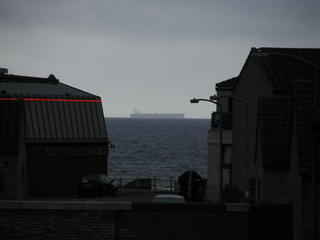CURRENT NEWS
Late into work on Monday, as the first I knew of the bus strike was when I was actually waiting for the bus. Took some flak for this because it was reported in the Evening News, the Metro, etc etc. Well, I don't read the Evening News, don't know anyone who does; I do occasionally read the Metro because the entire thing fits nicely into a 15-minute tea break; I don't even read the Scotsman or the Guardian anymore, not the former since it was taken over by mates of Thatcher, and not the latter since I belatedly figured out that 94% of news, even in the Guardian, is about entertainment.
See Neil Postman's book
Amusing Ourselves to Death (Methuen, 1985, still in print) for a sidelight on this. It's about the rise of thinking based on a TV paradigm (which he argues is inescapably about soliciting an immediate reaction, and therefore entertainment) as opposed to a print paradigm (which he says inevitably requires distance, consideration, sober reflection on the part of the reader). I'm not sure that this latter point holds up when you look at, f'rinstance, any Sun article; however, there's some great material in there, some fascinating history (Lincoln giving a seven-hour speech, admittedly with a break so everyone could go home for dinner, on completion of which his audience presented him with questions), and the central idea that entertaining people keeps them from thinking, which is an oldie but needs to be repeated as often as possible. It's Commodus' trick in
Gladiator. Bread and circuses.
On a tip from a colleague have been looking at
medialens, which claims to free hacks of the restraints of so-called impartiality imposed by the Beeb, ITV and the mainstream media. I have to say I'm not bowled over by it, though there is an archive of good reportage, particularly from Robert Fisk and John Pilger - in other words, from the guys who have actually done the groundwork. The problem with so much of what comes from the Left, for want of a better word, is that it's shrill, overwritten and self-righteous. All you have to do is present the facts, which are so terrible they speak for themselves. Still, worth a look, and
anything that stands against media collusion with atrocity is worth supporting.
Moving on, kind of, a couple of quotes:
"Here I saw an ugly sight: a British officer interrogating [a civilian], and repeatedly hitting him about the head with a chair; treatment which [the civilian], his face a mask of blood, suffered with stoicism. At the end of the interrogation, which had not been considered successful, the officer called in a private...and asked him in a pleasant, conversational sort of manner, 'Would you like to take this man away, and shoot him?' The private's reply was to spit on his hands, and say, 'I don't mind if I do, sir.' The most revolting episode I have seen since joining the forces."
Not from Iraq, as you'll have gathered from the tone, but from Norman Lewis'
Naples '44.
And this:
"They bound their hands and feet together round a fallen tree in such a way that their backsides...were sticking up nicely in the air. Then they pulled down their trousers, took several yards of fuse, tied knots in it and ran it up and down in their arses to such effect that the blood came pouring out. The peasants screamed pitifully, but the soldiers were enjoying it and did not stop their sawing until they were through the skin and flesh and down to the bone."
Not Bosnia, not Chechnya, but from Grimmelshausen's
Simplicissimus, first published in 1668, and based on the author's experience of the Thirty Years War, a conflict so devastating, I read, that Germany knew nothing that came even close to it until the Second World War, 300 years later.
The point being the old one that literature is news that stays news. How long will we have to wait before the true accounts of what's been going on in Iraq, Afghanistan, Chechnya emerge and become acknowledged as "classics"? Where are the latter-day accounts which will match
Homage to Catalonia or
All Quiet on the Western Front?
Possibly it'll never happen. Postman may be right to this extent: that the ephemeral nature of TV militates against memory. We think that the record has been established, that it's all on tape somewhere, but what memory really requires is narrative.
And in the meantime, a little truth wouldn't hurt.





